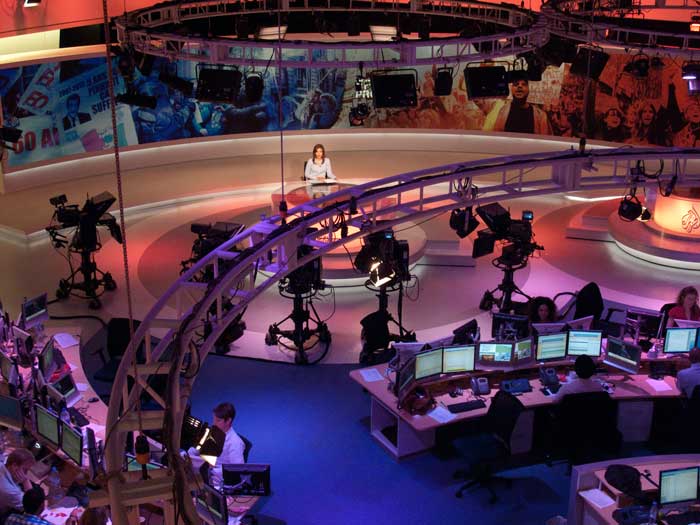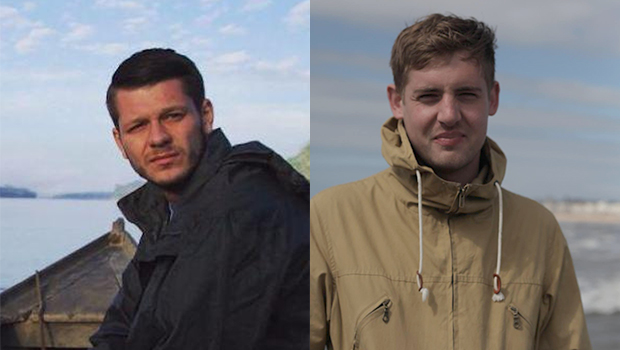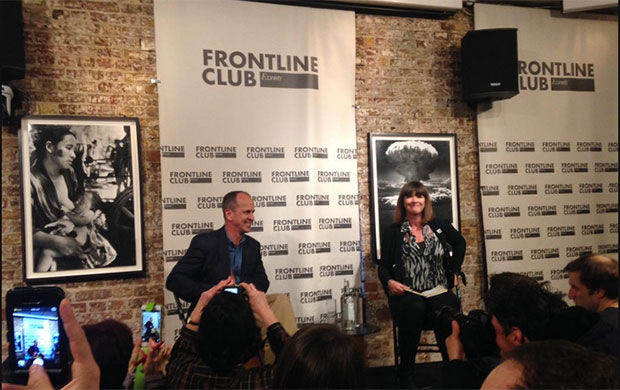Index relies entirely on the support of donors and readers to do its work.
Help us keep amplifying censored voices today.
[vc_row][vc_column][vc_column_text]

Al Jazeera Broadcast Center in Doha, Qatar
A debate at the Frontline Club last night on the future of Al Jazeera and media freedom in the Middle East, following recent calls for the closure of the television network by a group of seven Arab countries led by Saudi Arabia, did not go to plan.
The original chair, BBC security correspondent Frank Gardner, pulled out of the debate and was replaced by Safa Al Ahmad, a Saudi journalist and filmmaker and the winner of the 2015 Index on Censorship Freedom of Expression Award for Journalism.
According to Arab News, sources within the BBC said Gardner’s decision was because the event was deemed “a propaganda stunt by Qatar and Al Jazeera with no attempt at balance on the panel”. In an email to Arab News, the BBC source allegedly criticised the failure “to invite anyone from the UAE, Saudi, Bahrain or Egypt onto the panel in time”.
A group of 12-15 protesters outside the Frontline Club could be heard during the debate. They chanted, among other things: “Ban Al Jazeera.” They carried Egyptian flags and signs reading: “Al Jazeera Promotes Terrorism.”
Protest happening right now outside @frontlineclub after a talk on Al Jazeera pic.twitter.com/9q3vhc771D
— Sophia Smith Galer (@sophiasgaler) July 17, 2017
This anger was matched inside as audience members aired various grievances, including complaints about the network’s editorial line, its ties to and funding from the state of Qatar, Al Jazeera Arabic’s alleged sectarianism and anti-Shia bias and the treatment of Al Jazeera staff. Some audience members openly supported the calls to ban Al Jazeera.
“Al Jazeera is media prostitution by Qatar,” an audience member shouted at the panel, echoing a protester outside who added that the network wanted to “destroy the Middle East”.
Journalist Ben Flanagan from Arab News, an English-language newspaper published in Saudi Arabia and owned by a member of the House of Saud, put it to the panel that Al Jazeera “has been used as a platform for terrorists and extremists” and asked panelists Giles Trendle, managing director of Al Jazeera English, and Wad Khanfar, the ex-director general of Al Jazeera Media Network: “Do you feel you have blood on your hands?”
During his opening statement, Trendle said: “We are funded by the state of Qatar but we maintain an editorial independence, so there isn’t a lot of direct communication with the channel.”
Khanfar said that while Qatar “is not a charitable organisation”, “the reputation of Al Jazeera and the popularity of Al Jazeera prevented the state of Qatar from using Al Jazeera and they created a healthy distance between us at that time as an editorial newsroom and the state.”
Concerns over the treatment of staff at Al Jazeera almost certainly weren’t eased when Khanfar told Flanagan that if he worked for Khanfar at Al Jazeera he would be fired if he had any objections to interviewing a controversial figure like Osama bin Laden.
“Staff are leaving, but within any organisation there is a certain churn rate,” Trendle later added. “People come and people go.”
At one point an audience member took to the aisle, interrupted Khanfar and shouted something about Al Jazeera’s failure to report on “American involvement” in the 2012 sarin gas attack in Damascus, a conspiracy theory originated by journalist Seymour Hersh and propagated on media outlets such as Alex Jones’ Infowars.
Al Jazeera isn’t the only news outlet Saudi-led coalition’s crosshairs. The London-based Middle East Eye is also on the list. Editor David Hearst, one of last night’s panellists, clarified that the news website is independently funded. “We’re not funded by Qatar,” he said. “If Qatar rolled over, it would have absolutely no effect on us.”
Hearst believes that the reason these Arab states – including Egypt, Bahrain and the UAE – are attacking certain media organisations is that “they are really dead scared of independent criticism or examination of what’s going on,” particularly when such criticism is in Arabic. “They don’t like their own people, Arabs, reading genuinely independent news, and that is what I think started this whole thing off.”
Hearst said that the reach of Al Jazeera, which has an audience 310 million households in more than 100 countries, makes the network, in particular, a threat.
Trendle gave assurances that despite the current pressure, Al Jazeera will not be shutting its doors and remains committed to “balanced, professional” journalism. “It’s kind of business as normal in an abnormal situation,” he said.
“As journalists, we all need to stand together in solidarity against this intimidation, against this bullying. We need to stand against being censored or silenced in any way at all,” Trendle added. “We all need to stand in unison as journalists because journalism is under attack, and in recent years it’s become much clearer that it is coming under attack in a very serious way from governments as well.”
Panellist Marc Owen Jones, a professor at the Institute of Arab and Islamic Studies at Exeter University, while agreeing with Trendle, added that there needs to be a broader conversation about public service broadcasting.
“How can we have commercial media if it’s funded by weapons manufacturers? If we’re covering health case, we can’t have it funded by Big Pharma? You have to ask questions. Is it problematic to have media channels funded by non-democratic states or authoritarian states in the region if you want to really progress to another level of journalism?”
A proper debate is still to be had as Monday’s shouting match didn’t quite achieve its aim.
Index on Censorship re-iterates its position given by Index magazine editor Rachael Jolley in June: “Al Jazeera and press freedom must not be used as a bargaining chip.”[/vc_column_text][/vc_column][/vc_row][vc_row][vc_column][vc_basic_grid post_type=”post” max_items=”4″ element_width=”6″ grid_id=”vc_gid:1500396083270-89581cd9-54bd-6″ taxonomies=”449″][/vc_column][/vc_row]
[vc_row][vc_column][vc_column_text]The call by four Arab states — UAE, Bahrain, Saudi Arabia and Egypt — for Qatar to close news network Al Jazeera is clearly motivated by a desire to control the media in the region and silence reporting of stories that these governments would rather not see exposed.
Al Jazeera has brought the world news from the Arab Spring and many of the recent important moments from the region. Including the closure of Al Jazeera in a list of demands that Qatar “should” comply with to end a diplomatic crisis is about reducing media freedom in a region where it is already threatened.
“From its treatment of blogger Raif Badawi to its tightly controlled media environment, the Saudi authorities must not be able to dictate access to information for the public in other countries. Al Jazeera and press freedom must not be used as a bargaining chip,” Rachael Jolley, editor of Index on Censorship said.
None of the nations involved have a free independent media. Bahrain regularly targets critics, journalists and the one remaining opposition newspaper in the country, Al Wasat. Saudi Arabia sentenced blogger Raif Badawi to 10 years in jail and 1,000 lashes for his “criminal” writings. Egypt has regularly tried journalists on accusations of terrorism. The UAE, too, curtails discussion of its domestic policies. UAE Federal Law No. 15 of 1980 for Printed Matter and Publications regulates all aspects of the media and is considered one of the most restrictive press laws in the Arab world, according to Freedom House. Reporters Without Borders ranks them all below 118, with Saudi Arabia, Egypt and Bahrain all below 160 out of the 180 nations it covers.[/vc_column_text][/vc_column][/vc_row][vc_row][vc_column][vc_basic_grid post_type=”post” max_items=”12″ style=”load-more” items_per_page=”4″ element_width=”6″ grid_id=”vc_gid:1498231474147-ef0d779a-68d3-0″ taxonomies=”9044″][/vc_column][/vc_row]

British journalists Jake Hanrahan, left, and Philip Pendlebury and Iraqi translator and journalist Mohammed Ismael Rasool were filming clashes between pro-Kurdish youths and security forces, according to Vice. (Photos: Vice News)
The arrest by Turkey of journalists for Vice News, just two days after the sentencing of Al Jazeera reporters in Egypt, demonstrates how easily terror laws can be abused to stifle a free and independent media.
It should be a wake-up call for the UK, which in the next few months will introduce yet another piece of anti-terrorism and extremism legislation that could be used in much the same way.
On Monday, two British reporters and a translator working for international news organisation Vice News were charged by a Turkish court for “working on behalf of a terrorist organisation”, after filming clashes between government forces and Kurdish militants. The charges came just days after the sentencing in Egypt of three Al Jazeera journalists – accused of aiding the banned Muslim Brotherhood – for “spreading false news”.
The injustice in both cases is patent. In both cases laws meant to tackle terrorism and extremism are being used against journalists simply trying to do their job: to report the news.
Tobias Ellwood, the UK Minister for the Middle East and North Africa, said he was, “deeply concerned by the sentences handed down” against the journalists in Egypt. But what should also be concerning us is how easily that could happen in the UK as the government seeks ever broader powers, and definitions of terrorism that uses language little different to that being used to charge journalists like those of Vice News and Al Jazeera.
The UK government already defines extremism very broadly, as “the vocal or active opposition to fundamental British values, including democracy, the rule of law, individual liberty and the mutual respect and tolerance of different faiths and beliefs” – a net wide enough to catch Islamic fundamentalists, neo-Nazis, but also potentially anyone who preaches, for example, against gay marriage. But the government is not content. Now it says it needs new laws to tackle those who “spread hate but who do not break existing laws”. And that is a net wide enough to catch, well, pretty much anyone who says anything with which the current government – or mainstream popular opinion – disagrees.
Conservative MP Mark Spencer argued last month that proposed new banning orders intended to clamp down on hate preachers and terrorist propagandists should be used against Christian teachers who teach children that “gay marriage is wrong”. And if that could be the case, it takes little imagination to see that “spreading hate” could easily be applied to those journalists who report on those groups and individuals who have hateful messages.
The government will argue that this is not how the law is intended. But you only have to look at communications intercept laws to see how easily “intentions” can be subverted and abused in practice. Police officers used powers afforded by the Regulation of Investigatory Powers Act (RIPA) – an act intended to deal with terrorists – to pull the phone records of Sun political editor Tom Newton Dunn so it could track down the officers accused of leaking information to the Sun over “Plebgate” – an incident with no terrorist implications whatsoever in which a minister was accused at swearing at the police.
The new extremism bill will be no different. It will give the government powers to ban a host of groups from speaking or publishing, powers that can easily be used to silence those not just with whom the government disagrees, but those on whom we rely to convey information – even when that information, as is so often the case with those brave enough to report on the most violent extremism, is deeply unpalatable.
Britain has rightly described itself as shocked by the Al Jazeera verdict in Egypt. I hope it will be vocal in its condemnation of the arrest of VICE News’ journalists in Turkey. And I hope it will then reconsider its plans to introduce new terror laws that will stifle free expression and a free media.
This article was originally posted at Open Democracy on 1 September 2015

Peter Greste spoke to a Frontline Club audience about his arrest and detention in Egypt. (Photo: Milana Knezevic / Index on Censorship)
Peter Greste, the Al Jazeera journalist recently released after 400 days in Egyptian jail, met a packed room at London’s Frontline Club on Thursday, where he spoke about his time in jail, the campaign for his release and fellow journalists still imprisoned in Egypt. “An attack on journalism, an attack on freedom of speech, is an attack on the wider society,” he said.
“I remember that day well,” he said, recounting 29 December 2013, when a group of around eight men came to his Cairo hotel room and without explanation started searching it, before talking him away. While he was aware that the media was under some pressure in Egypt, the arrest came as a surprise. He felt as long as they stuck to their journalistic principles and didn’t push boundaries, they would be fine.
“There have been plenty of stories before where I’ve pushed boundaries, when I fully expected to get a knock on the door from the police, when I know I’ve upset governments,” he explained. But this time around, he hadn’t gone looking for difficult stories or made a conscious effort to try and challenge the government, so he “genuinely didn’t think it was going to be an issue.”
Greste was imprisoned together with Al Jazeera producer Baher Mohamed and Al Jazeera English’s Cairo bureau chief Mohamed Fahmy. He said they forced themselves to consider that they might be convicted, but never seriously believed it.
While there were “some very dark moments”, he insisted anger wasn’t his dominant emotion, believing that letting anger take hold of the situation would only hurt himself. They were broadly treated with respect in prison, and never physically threatened. “The problem is that in prison…what really matters is your own head, your own mind and how you cope with it.”
Egypt
Index has reported extensively on the situation confronting free expression in the country
Committee to Protect Journalists named Egypt as one of the world’s top 10 jailers of journalists in Dec 2014
Reporters Without Borders: World Press Freedom Index ranks the country as 159
Freedom House: Classifies Egypt as “not free”
Greste spoke of the importance of having a routine and some structure to his day, crediting seemingly simple things like meditation, exercise, studying and even cooking with helping him though the ordeal.
“The only way through is to set your horizon, to set a target date, to set something that’s manageable,” he said. “What you do is narrow your horizon, to the thing that you think you can cope with. Sometimes that was the end of next week, or it would be to the next visit. Sometimes it would be simply to the end of the day.”
Today, he doesn’t feel traumatised, and believes that we are all more capable of dealing with difficult situations than we think. And when discussing the conditions in prison, it was clear he had kept his humour. “The less said about the toilets the better,” he joked.
If his detention had been a surprise, so was his release. He had been expecting his brother for a visit, when he got the unexpected message to pack his bags — he was going home. Himself, Fahmy and Mohamed had discussed the possibility that one of them might be released before the others, and all agreed that if that were to happen, there would be no doubt that that person should go.
And yet, Greste said walking away and leaving Mohamed and others (Fahmy was receiving medical treatment at the time) behind was not easy. “And I still feel that and I still feel quite anguished about it.” His two colleagues have now been released on bail, with their retrial set to start on Monday.
Greste was also keen to remind us that while the three of them had been given the most media attention, many others had been caught up in the case — including three young students, a businessman and journalists sentenced in absentia.
“We can’t forget that sympathy tends to go with people who you identify with. As a European, as a white guy, it’s easier for white Europeans to identify with me than it is to identify with an Egyptian. I’m not suggesting for a second that that makes Baher’s case any less worthy. And in a way we need to bear that in mind, that because of that trend, it’s so easy to let local journalists slip through the cracks,” he also added. “It is the locals that get hit, and the freelancers in particular.”
He said he’ll continue to report, though he is not yet sure what form his work will take. He also hopes to continue to speak out for press freedom.
“One of the most extraordinary elements of this, and one that we are in danger of losing, if we do not make a conscious effort to hold on to, is the unity of purpose that emerged within the media community around our case. For some reason, the community right across the globe pulled together in a way that I think is absolutely unprecedented; we’ve never seen anything like this ever before,” he said.
“If we lose that sense of purpose, then we lose something that we have created of enormous value. I think its very difficult to maintain, particularly under the current circumstances, but I think it’s incumbent on everybody to recognise it, to make use of it, not just in our case but in the case of every journalist that’s been imprisoned.”
This article was posted on 20 February 2015 at indexoncensorship.org